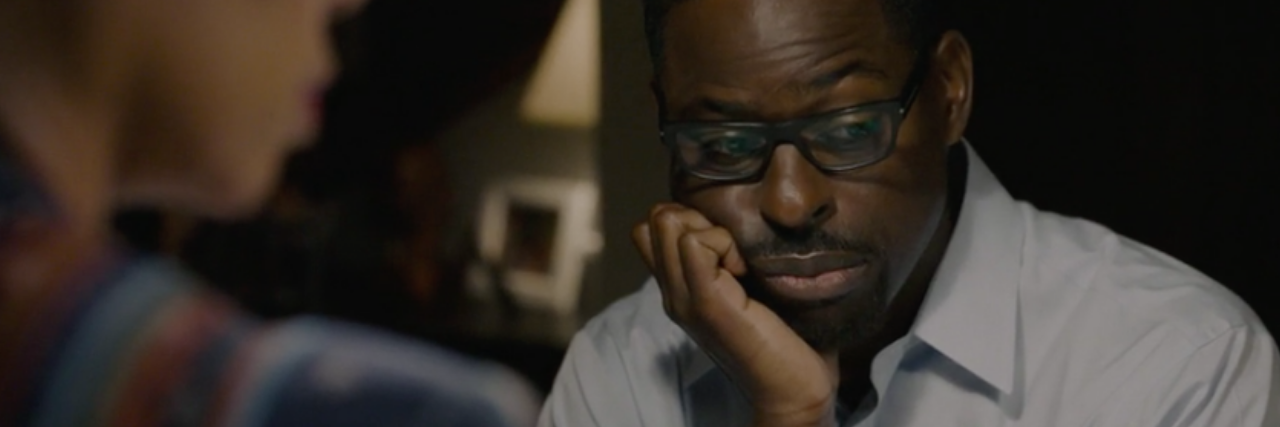'This Is Us' Season 4, Episode 5 Depicts a Common Fear of Anxious Parents
Editor's Note
The following is a review for season 4, episode 5 of “This Is Us,” and contains spoilers.
The show “This Is Us” has captured our hearts for several seasons now. We have seen Kate, Randall and Kevin, as well as their families and lovers, grow and develop over each season. We have experienced joy and loss with them. Another huge thing we have experienced with them — their individual challenges and journeys with mental health issues.
This includes Kate’s addiction to food; Toby’s severe depression; Kevin’s overall issues with addiction and depression; Jack’s addiction, avoidance and guilt; Uncle Nicky’s post-traumatic stress disorder (PTSD) and finally, Randall’s anxiety.
The mental health struggles on the show are revealed like layers of an onion season after season. Randall in particular is in a unique situation. We know he is not biologically connected to his siblings and his challenges seem to be a bit different — he struggles with his identity and he longs to feel connected to something.
In more recent episodes, we learned that Randall’s anxiety began as a small child. When he had his first panic attack as a student, his brother, Kevin, came to his rescue. His parents were unaware of this for years. In the first season, we see he had a panic attack at work and was hospitalized. We don’t hear much about this again until this most recent season, where we see a flashback of Beth (Randall’s wife) talking to William (Randall’s biological father who also struggled with addiction and anxiety) about the breakdown.
Randall’s history with anxiety comes up again in “Storybook Love,” the fifth episode of the current season (season 4). Their now middle child Tess has a panic attack at school. When Randall starts telling her about his own struggles with anxiety, Tess yells back, “I don’t want to be like you!” and storms off. Randall is taken aback, so Beth says she will handle it. The show flips back to his breakdown in season 1. In this flashback, William (Randall’s biological father) reveals he also had anxiety.
Tess yells back, “I don’t want to be like you!” and storms off.
We flip back to present day and the family is in the kitchen. Beth gives Tess a pep talk, telling her while she doesn’t want to admit she’s like her father, she’s inherited his obsession with caring for others — and his anxiety. She tells Tess she’ll have to learn to manage that. Then, as a metaphor for anxiety, she pours some seltzer water into a glass. “Wait for the bubbles to settle,” Beth says. In a flashback, we learn this is how William’s mom helped soothe his own anxiety.
As the episode concludes, Beth says she found a good therapist for Tess — and also for Randall. Randall pauses and says he is fine, but Beth points out he isn’t. He is overcompensating and she doesn’t want him to implode. He agrees to see the therapist.
Why was this episode important? Well, for a few reasons. In many (OK, pretty much all) homes of people of color, it’s difficult to discuss mental health, period. You just deal with it. In my experience, you are told, “What happens in this house stays in this house.” This could be why we have the highest rate of cardiovascular disease, who knows. Also, our strong religious values often don’t leave room for psychology. Many of us are told, “You don’t need therapy, you need Jesus.”
This mentality has prevented many people in the black community from seeking mental health care. Some fear stigma because our older family members don’t understand or have never openly discussed mental health.
On the other side, sometimes our families “hide” or excommunicate family members who do struggle with mental health issues rather than support them. It wasn’t until I was in my 20s that I learned I had an aunt who had a tough time with depression. My family would hide the fact she was going to get help, sometimes telling us she was “on vacation.” No, Auntie was taking care of herself.
Better yet, my own father had severe mental health issues. For much of my childhood, my mother covered up that he was receiving treatment for his mental health. I was in college when he finally told me about what he was going through.
We as a culture have to do better, and ‘This Is Us’ sets a great example of what those conversations can look like.
As we see in pretty much every episode of “This Is Us,” mental illness, regardless of the diagnosis, can be a family disease. It affects all of us — and since certain mental health struggles run in families, family support can be so important.
As a community and culture, we can make talking about mental health easier — and it should start at home. Maybe Tess wouldn’t have freaked out about her panic attack. Maybe she would have understood that it’s OK to be like her dad, it’s OK to have anxiety. We as a culture have to do better, and “This Is Us” sets a great example of what those conversations can look like.
Rating: 
Did you watch this episode? Let us know your take in the comments below.

